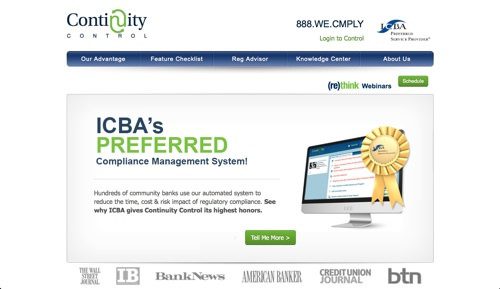Guess which fintech company’s just-completed, $6 million Series B round comes stamped “Intel Inside”?
Zumigo Raises $6 Million in Investment Led by Intel Capital

Finovate is part of the Informa Connect Division of Informa PLC
This site is operated by a business or businesses owned by Informa PLC and all copyright resides with them. Informa PLC's registered office is 5 Howick Place, London SW1P 1WG. Registered in England and Wales. Number 8860726.

Guess which fintech company’s just-completed, $6 million Series B round comes stamped “Intel Inside”?
 EyeVerify raises $6 million in Series A round, joins Wells Fargo Startup Accelerator.
EyeVerify raises $6 million in Series A round, joins Wells Fargo Startup Accelerator.
If you missed the first installment of our FinovateFall 2014 Sneak Peek series, click here for Part 1.
![]()

With participation from Wells Fargo, Qihoo 360 and Sprint, as well as existing investors, EyeVerify just announced that it closed a $6 million Series A funding round.
The investment takes EyeVerify’s total capital to more than $10 million.


Referring to its $10 million investment as “growth funding,” compliance-management specialist Continuity Control says it is even better positioned to expand its regulatory intelligence platform for FIs.
The company’s total capital now stands at $12 million.

Of the three companies participating in the inaugural Wells Fargo Startup Accelerator, two are Finovate alums. One is EyeVerify, which also reported a $6 million dollar investment on Wednesday. The other is Zumigo.
What was it about Zumigo in particular that caught Wells Fargo’s eye? According to Zumigo, the big bank is especially interested in the company’s mobile location intelligence technology, which provides authentication services for mobile transactions. Zumigo’s solution allows financial institutions to be more proactive than is “current industry practice,” according to Chirag Bakshi, founder and CEO of Zumigo.
 American Banker takes a look at the new Wells Fargo Startup Accelerator, with alums EyeVerify and Zumigo in the inaugural class.
American Banker takes a look at the new Wells Fargo Startup Accelerator, with alums EyeVerify and Zumigo in the inaugural class.
In the weeks leading up to our inaugural FinDEVr conference, we’re taking a look at the more than 40 speakers who will be making presentations. Click here to see the full agenda.
First up is Yodlee Interactive. Yodlee was a presenter at the first Finovate event in 2007, and continues that tradition by being a big part of the inaugural FinDEVr. In addition to its keynote address, Yodlee will deliver three workshops on the second day (see below).
Joe is a graduate of the Stanford Graduate School of Business Executive Program, holds a juries doctorate and degree in Economics from Santa Clara University.
Session also features Cheung Tam and Guest Developers.

With the busy product development and release schedule that comes with the autumn season, FinovateFall is the perfect place to see what’s new in fintech.
Here’s an inside look at six of these hand-picked companies:
BizEquity has invented the first and only patented way to value any business in real-time and in the cloud online.
Features:
Why it’s great:
BizEquity’s mission is to democratize business valuation knowledge globally to every small business and financial institution through its patented cloud-based service.
Presenters:
1) Mike Carter, CEO
Carter is former Managing Director of The Musser Group, former Founder and CEO of Dashboard Systems, and former Chief Marketing Officer for U.S. Interactive.
LinkedIn
2) Semyon Fishman, Vice President of Engineering and Technology
Fishman is former Vice President of Product Engineering at Valex Consulting and former Lead Engineer for the Math Forum.
GREMLN Financial Social Media offers secure social media tools for the financial services industry. It’s a full marketing and analysis suite wrapped in a security layer to maintain compliance.
Features:
Why it’s great:
Social media involvement is essential, but it can be dangerous for financial services companies. Gremln makes it possible to participate and succeed in social media…safely.
Presenters:
1) Ryan Bell, CEO
LinkedIn
2) TJ Tavares, Senior Sales Executive
LinkedIn
Hoyos Labs‘ app will finally put an end to the frustration that comes with usernames, passwords and PINs by replacing them with your unique biometrics.
Knox Payments is a merchant tool for payments to and from bank accounts online for just $0.18/transaction.
Features:
Why it’s great:
Fastest, cheapest checkout process for you and your customers.
Presenter:
Tommy Nicholas, Head of Product
Nicholas earned his BA from the University of Virginia. He founded CitySwig and helped grow Coffitivity to over 2 million users.
LinkedIn
NopSec is a cloud-based vulnerability risk management SaaS.
Features:
Why it’s great:
Remediate what matters most, faster.
Presenters:
1) Steven Leonard, Chief Marketing Officer
Leonard is responsible for all areas of marketing strategy and execution. Prior to NopSec, he spent 17 years at Microsoft Corporation.
LinkedIn
2) Lisa Xu, Chief Executive Officer
Xu is responsible for strategic direction, sales, and operations. Prior to NopSec, she advised Fortune500 enterprises on data security, privacy and technology risk management.
LinkedIn
3) Michelangelo Sidagni, CTO
Rippleshot detects bank card data breaches. Its cloud-based solution helps banks proactively stop fraud before it occurs and protects merchant brand reputation.
Stay tuned later this week for a look at six more companies set to debut their new technology at FinovateFall this September 23 & 24 in New York.

![]()
For mobile shoppers using PayPal, instant gratification just got a little more instantaneous.
PayPal announced today that it is opening up beta access to its One Touch feature. This feature allows people to pay with PayPal with a single swipe from inside other apps. Initially available only to iOS users, the feature will be accessible for Android users in September when the product is officially launched.
 LivePlan launches its Black Widow update to enhance performance monitoring.
LivePlan launches its Black Widow update to enhance performance monitoring. Silanis Technology releases e-signature solutions for Salesforce and Microsoft Dynamics CRM. See Silanis at FinovateFall 2014 in New York.
Silanis Technology releases e-signature solutions for Salesforce and Microsoft Dynamics CRM. See Silanis at FinovateFall 2014 in New York.